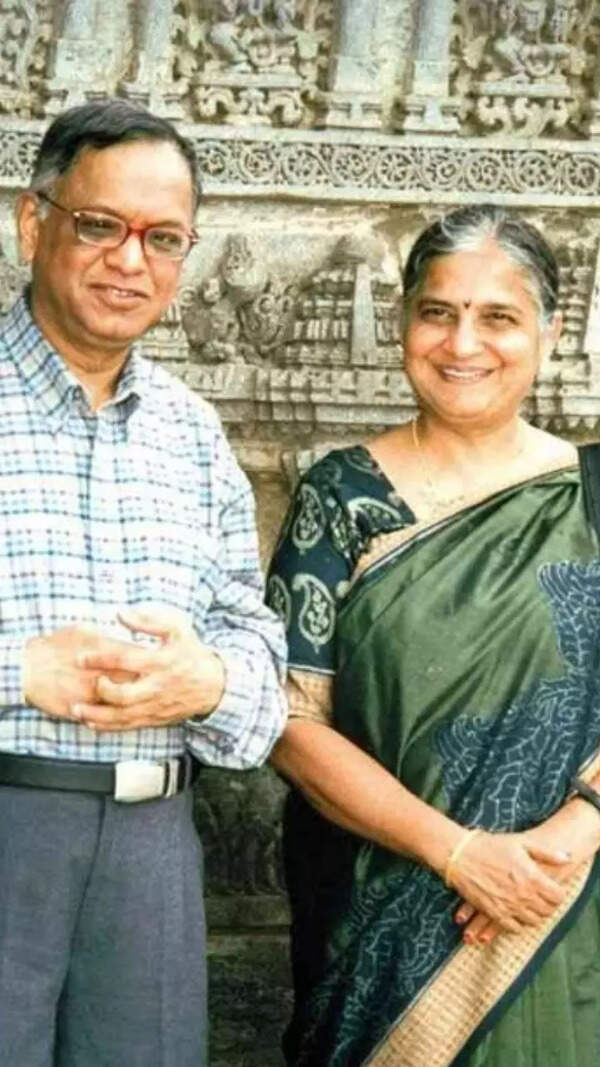Top Searches
- News
- India News
- 'Jai Japan, Jai India': How bilateral ties expanded under Shinzo Abe
'Jai Japan, Jai India': How bilateral ties expanded under Shinzo Abe
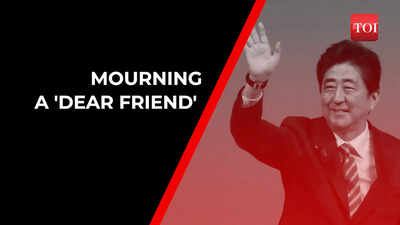
Former Japanese Prime Minister Shinzo Abe shakes hands with Prime Minister Narendra Modi in Yamanashi, Japan (PTI file photo)
NEW DELHI: Shinzo Abe as Japan Prime Minister was always vocal for strong relations with India, a legacy that he "inherited." India and Japan have a mutual stake in each other’s success, Abe had repeatedly affirmed.
Abe visited India four times during his two stints as Japan Prime Minister.
According to former Indian ambassador to Japan Hemant Krishan Singh, "Abe’s deep and abiding commitment to forging strategic ties with India was founded on the legacy of his maternal grandfather Nobusuke Kishi (PM of Japan 1957-60). In his 2007 book ‘Towards a Beautiful Country: My Vision for Japan’, Abe wrote that it would “not be a surprise if in another decade, Japan-India relations overtake Japan-US and Japan-China ties.”
Abe's 2007 visit, address in Parliament
Abe visited India in 2007 during his first stint as Japan PM, when the UPA government of Manmohan Singh was in power. His address to the Indian Parliament on August 22 was dubbed the "Confluence of the Two Seas."

"Our two countries have the ability- and the responsibility- to ensure that it broadens yet further and to nurture and enrich these seas to become seas of clearest transparence," Abe said in his Parliament address.
In the days that followed, Japan began its investments in India’s northeast, the first nation to do so, in a sign that the two countries were cementing their global outlook in the face of a rising China.
Live updates: Former Japan PM Shinzo Abe assassinated
India-Japan strategic and global partnership
A joint statement - "Towards India Japan Strategic and Global Partnership" was signed between Manmohan Singh and Shinzo Abe in Japan, in 2006.
When Abe visited India the following year, two more documents, "The Roadmap for New Dimensions to the Strategic and Global Partnership between India and Japan" and “Enhancement of Cooperation on Environmental Protection and Energy Security” were signed.
India-Japan bilateral relations were upgraded to a strategic and global partnership in 2006, and again to a “special” strategic and global partnership in 2014. They have progressed steadily across the fields of investment, economic infrastructure and development, civil nuclear technology, and defence and security," ambassador Singh observed in an article written for the Economic Times in September, 2020.

Close personal bond with PM Modi
If the foundation of a new era in India-Japan relations were laid under the UPA of Manmohan Singh, they were taken to new levels after 2014 with Narendra Modi at the helm in India.
The two leaders had struck a friendly working relationship even before that, when Modi visited Japan as Gujarat chief minister.
In his first term as PM, Modi had deployed a single points person in the PMO to facilitate Japanese investment. Japan was also the only country to post a serving official in India’s commerce ministry. Abe used the India ties to turn Japan around by opening up defence exports and conducting military drills.
Even after Abe had demitted office, PM Modi paid him a visit while in Japan in May this year for the second in-person Quad summit.
In pics: India-Japan relations during Shinzo Abe's times
Abe's 2014 visit, chief guest at Republic Day parade
Japan's Prime Minister Shinzo Abe was the chief guest at the 65th Republic Day parade on January 26, 2014, becoming the first premier from the country to grace the occasion.
During Abe's visit, India extended an invitation to Japan to participate in the next India-US naval exercise. Eight agreements were signed during Abe's trip, including in the areas of power, telecom and energy.
Abe's 2015 visit, witnessing Ganga Aarti at Varanasi
Abe during his 2015 visit to India, accompanied PM Modi to his parliamentary constituency Varanasi, where they witnessed the famous ganga Aarti at the historic Dashashwamedh ghat.
 PM Modi and former Japan PM Shinzo Abe witness Ganga Arati in Varanasi (File photo)
PM Modi and former Japan PM Shinzo Abe witness Ganga Arati in Varanasi (File photo)
Abe's 2017 visit, launching of bullet train project
During his 2017 visit, Abe was in Modi's home state Gujarat, where he laid the foundation of the Mumbai-Ahmedabad bullet train project. The project, a joint venture between Indian Railways and Japan’s Shinkansen Technology, is likely to be completed by 2026. Japan has funded the project with a loan of Rs 88,000 crore at low interest.
Shinzo Abe also coined the phrase "Jai Japan, Jai India" while launching the project.
The total length of the rail link will be just over 500 kms, to be covered in about 2 hours. Trains are expected to run at a speed of 320 kmph.

For the major part, the tracks will be laid on an elevated corridor. But it will also include a 7 km undersea stretch between Thane and Vasai, and another 15km running underground in Mumbai.
Economic cooperation grew under Abe
India-Japan economic cooperation grew steadily under Abe. Direct investment from Japan grew from 223 billion Yen in 2012 to 624bn Yen in 2019, before dropping to 204 billion during pandemic affected 2020.
Economic assistance in the form of loans for 2020 was 356.30 billion Yen, grants 5.02 bn Yen and technical cooperation 8.7bn Yen.
In May this, year, a top Japanese diplomat said that his country had an investment target of 5 trillion Yen for India over the next 5 years.
Reviving the Quad
The Quad, a grouping comprising India, Japan, US and Australia, came into being in 2007, much due to Abe's efforts. India, Japan and US participated in a joint military drill off Japan coast soon after.
Although Quad emphasizes on the vision of a free and open Indo-Pacific, China's growing assertiveness in the region is believed to be the galvanising force.
The Quad seemed to be running out of steam in the years following its formation, in part due to reticence from the Australian dispensation of Kevin Rudd, who did not want to ruffle feathers with China.
But by 2017, the geo-politics of the region had changed, and Quad members felt a need to revitalise their strategic cooperation.
Shinzo Abe is credited for the revival of the Quad since 2017. His meeting with other Quad leaders in Manila, on the sidelines of the East Asia Summit in November that year, gave direction to the Quad for its future endeavours.
Abe awarded Padma Vibhushan
In 2021, India honoured Abe with Padma Vibhushan, the second highest civilian award, for "excellence in public affairs."
Watch How Shinzo Abe and PM Modi shaped the Japan-India strategic partnership
Abe visited India four times during his two stints as Japan Prime Minister.
According to former Indian ambassador to Japan Hemant Krishan Singh, "Abe’s deep and abiding commitment to forging strategic ties with India was founded on the legacy of his maternal grandfather Nobusuke Kishi (PM of Japan 1957-60). In his 2007 book ‘Towards a Beautiful Country: My Vision for Japan’, Abe wrote that it would “not be a surprise if in another decade, Japan-India relations overtake Japan-US and Japan-China ties.”
Abe's 2007 visit, address in Parliament
Abe visited India in 2007 during his first stint as Japan PM, when the UPA government of Manmohan Singh was in power. His address to the Indian Parliament on August 22 was dubbed the "Confluence of the Two Seas."
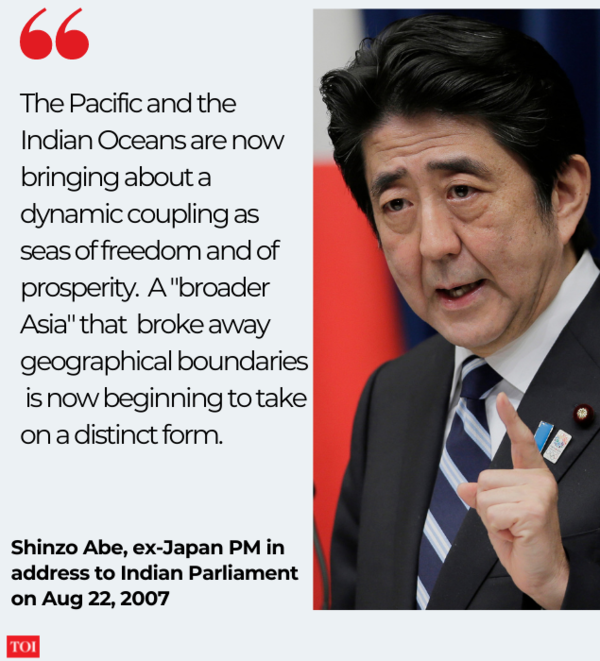
"Our two countries have the ability- and the responsibility- to ensure that it broadens yet further and to nurture and enrich these seas to become seas of clearest transparence," Abe said in his Parliament address.
In the days that followed, Japan began its investments in India’s northeast, the first nation to do so, in a sign that the two countries were cementing their global outlook in the face of a rising China.
Live updates: Former Japan PM Shinzo Abe assassinated
India-Japan strategic and global partnership
A joint statement - "Towards India Japan Strategic and Global Partnership" was signed between Manmohan Singh and Shinzo Abe in Japan, in 2006.
When Abe visited India the following year, two more documents, "The Roadmap for New Dimensions to the Strategic and Global Partnership between India and Japan" and “Enhancement of Cooperation on Environmental Protection and Energy Security” were signed.
India-Japan bilateral relations were upgraded to a strategic and global partnership in 2006, and again to a “special” strategic and global partnership in 2014. They have progressed steadily across the fields of investment, economic infrastructure and development, civil nuclear technology, and defence and security," ambassador Singh observed in an article written for the Economic Times in September, 2020.
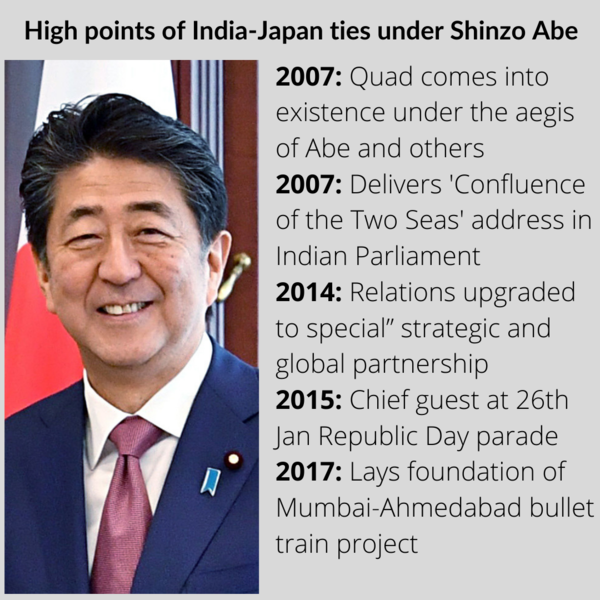
Close personal bond with PM Modi
If the foundation of a new era in India-Japan relations were laid under the UPA of Manmohan Singh, they were taken to new levels after 2014 with Narendra Modi at the helm in India.
The two leaders had struck a friendly working relationship even before that, when Modi visited Japan as Gujarat chief minister.
In his first term as PM, Modi had deployed a single points person in the PMO to facilitate Japanese investment. Japan was also the only country to post a serving official in India’s commerce ministry. Abe used the India ties to turn Japan around by opening up defence exports and conducting military drills.
Even after Abe had demitted office, PM Modi paid him a visit while in Japan in May this year for the second in-person Quad summit.
In pics: India-Japan relations during Shinzo Abe's times
Abe's 2014 visit, chief guest at Republic Day parade
Japan's Prime Minister Shinzo Abe was the chief guest at the 65th Republic Day parade on January 26, 2014, becoming the first premier from the country to grace the occasion.
During Abe's visit, India extended an invitation to Japan to participate in the next India-US naval exercise. Eight agreements were signed during Abe's trip, including in the areas of power, telecom and energy.
Abe's 2015 visit, witnessing Ganga Aarti at Varanasi
Abe during his 2015 visit to India, accompanied PM Modi to his parliamentary constituency Varanasi, where they witnessed the famous ganga Aarti at the historic Dashashwamedh ghat.
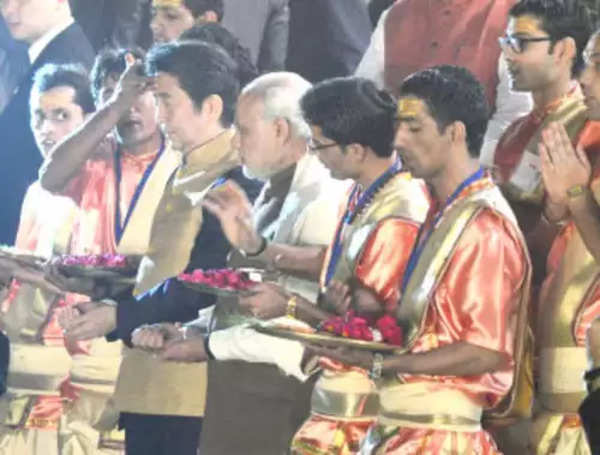
Abe's 2017 visit, launching of bullet train project
During his 2017 visit, Abe was in Modi's home state Gujarat, where he laid the foundation of the Mumbai-Ahmedabad bullet train project. The project, a joint venture between Indian Railways and Japan’s Shinkansen Technology, is likely to be completed by 2026. Japan has funded the project with a loan of Rs 88,000 crore at low interest.
Shinzo Abe also coined the phrase "Jai Japan, Jai India" while launching the project.
The total length of the rail link will be just over 500 kms, to be covered in about 2 hours. Trains are expected to run at a speed of 320 kmph.
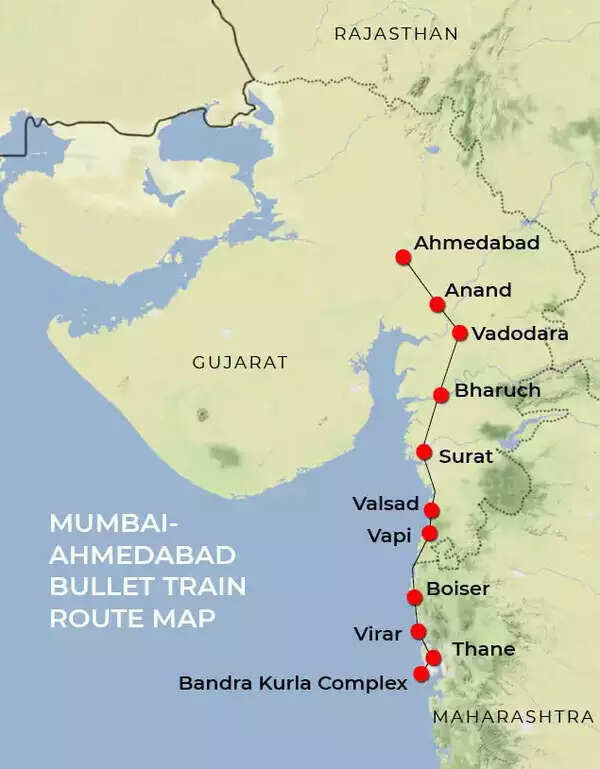
For the major part, the tracks will be laid on an elevated corridor. But it will also include a 7 km undersea stretch between Thane and Vasai, and another 15km running underground in Mumbai.
Economic cooperation grew under Abe
India-Japan economic cooperation grew steadily under Abe. Direct investment from Japan grew from 223 billion Yen in 2012 to 624bn Yen in 2019, before dropping to 204 billion during pandemic affected 2020.
Economic assistance in the form of loans for 2020 was 356.30 billion Yen, grants 5.02 bn Yen and technical cooperation 8.7bn Yen.
In May this, year, a top Japanese diplomat said that his country had an investment target of 5 trillion Yen for India over the next 5 years.
Reviving the Quad
The Quad, a grouping comprising India, Japan, US and Australia, came into being in 2007, much due to Abe's efforts. India, Japan and US participated in a joint military drill off Japan coast soon after.
Although Quad emphasizes on the vision of a free and open Indo-Pacific, China's growing assertiveness in the region is believed to be the galvanising force.
The Quad seemed to be running out of steam in the years following its formation, in part due to reticence from the Australian dispensation of Kevin Rudd, who did not want to ruffle feathers with China.
But by 2017, the geo-politics of the region had changed, and Quad members felt a need to revitalise their strategic cooperation.
Shinzo Abe is credited for the revival of the Quad since 2017. His meeting with other Quad leaders in Manila, on the sidelines of the East Asia Summit in November that year, gave direction to the Quad for its future endeavours.
Abe awarded Padma Vibhushan
In 2021, India honoured Abe with Padma Vibhushan, the second highest civilian award, for "excellence in public affairs."
Watch How Shinzo Abe and PM Modi shaped the Japan-India strategic partnership
FOLLOW US ON SOCIAL MEDIA
FacebookTwitterInstagramKOO APPYOUTUBE
Start a Conversation
end of article







